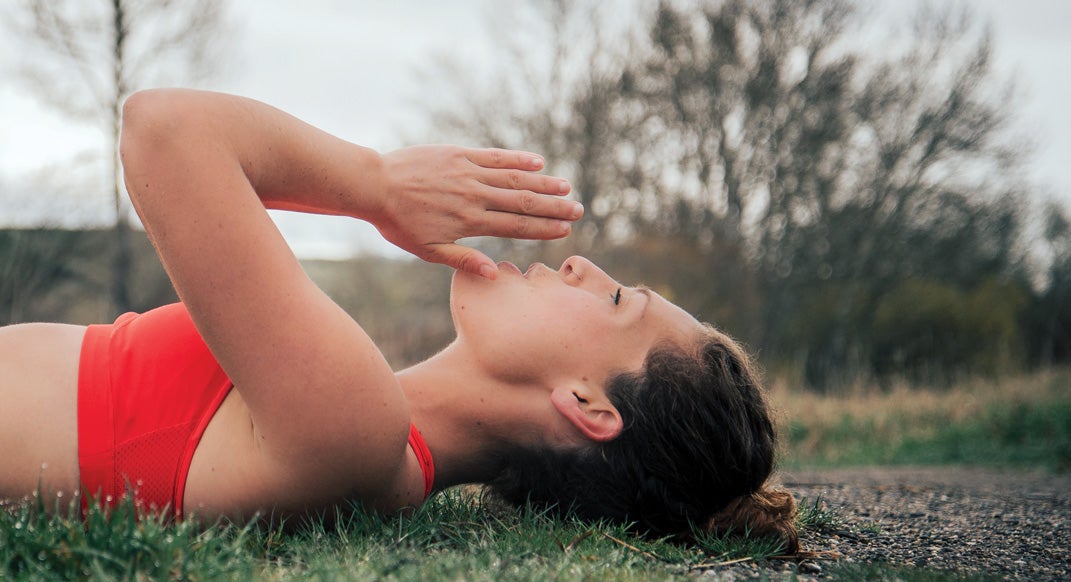Just Chill

As a runner who can’t tolerate idleness, I used to view non-running “rest days” as opportunities to get a lot of things done: more work, more chores and more busy-ness in general. Highly productive recovery days were satisfying, even if they weren’t actually restful. It wasn’t an issue until the lack of recovery caught up to me.
A few years ago, while training for a 100-miler, raising a toddler and working a demanding job involving frequent travel, I noticed my energy and motivation nosedive. My low-mileage training plan gave me plenty of days off, and yet, as the race drew near, my exhaustion worsened.
My running deteriorated, insomnia intensified and my body ached. After one particularly stressful work/rest day, my body responded to the emotional stress like a hard run: breathing shallow and rapid, hands shaking from the adrenaline, shoulders tense and back aching.
Needless to say, the next morning’s run was a slog. It turns out
that runners should be as deliberate with their rest as they are with
their training.
Relaxation Response
While the stress response primes the body for exertion, the relaxation response primes the body for rest and healing.
Dr. Herbert Bensen, M.D., director emeritus of the Harvard-affiliated Benson-Henry Institute for Mind Body Medicine, pioneered modern scientific understanding of the relaxation response, a term he coined in the 1970s as “a deep physiological shift in the body that’s the opposite of the stress response.”
It’s hardly an idle process when examined at the cellular level. In his best-selling book, The Relaxation Response, he explains its effect on the body, including alleviating inflammation, decreasing stress hormones, slowing the heart rate, lowering blood pressure and more.
Rest Is Better for the Brain
High-intensity training or a regular training load combined with a stressful lifestyle can be as hard on your brain as on your body. When you feel physically worn out, your mind may be less focused, able think positively or solve problems.
Sports and health researchers have identified mindfulness as a powerful tool for counteracting these effects.
For example, a June 2017 study from the University of Miami titled “We Are Talking About Practice: the Influence of Mindfulness vs. Relaxation Training on Athletes’ Attention and Well-Being over High-Demand Intervals,” tested the impact of a consistent mindfulness practice combined with physical relaxation on college football players. For one month, the players either meditated as little as 12 minutes or physically rested, or both meditated and rested on their recovery days.
After four weeks, the researchers assessed that the players who both meditated and physically rested between workouts were best at weathering the “emotional and cognitive impacts of high-demand, high-stress times” of their training.
However, if sitting on a meditation cushion for even 12 minutes sounds like torture to you, try practicing mindfulness during your recovery runs with the goal of eliciting the relaxation response. Dr. Benson suggests you “pay attention to the cadence of your feet on the ground—‘left, right, left, right’—and when distracting thoughts come into your mind, say, ‘Oh, well’ and return to ‘left, right, left right.’”
In other words, the goal is not to empty your mind of all thought, but rather, to steer your attention away from the thoughts and back to the motion of running. Honing your attention on the present moment is the simplest and most effective way to turn off the stress response and enter relaxation mode.
Heal While You Sleep
While meditation is no replacement for sleep, it can help you sleep better. Even low-grade stress that lasts all day can seriously disrupt sleep cycles, which negatively impacts athletic performance. Even if you have no problem falling asleep as soon as your head hits the pillow, if you’re wide awake at 2 a.m., stress may be the culprit.
And that could be an issue for runners since they may not be producing enough testosterone and other growth hormones to properly repair and build muscles or sufficiently rebalance their immune and nervous systems.
A short mindfulness practice before bed can help you sleep better and more consistently. A 2015 study from University of Southern California, published in the JAMA Internal Medicine, found meditation to be more effective for overcoming insomnia and fatigue than following recommended sleep guidelines among middle-aged and older adults.
Elinor Fish is creator of the Mindful Running Training System and leads women’s mindful-running retreats through her company, Run Wild Retreats + Wellness. www.RunWildRetreats.com